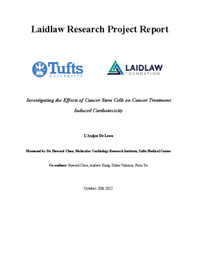Research Poster - Investigating the Effects of Cancer Stem Cells on Cancer Treatment Induced Cardiotoxicity
Poster Summary:
My research examined how cancer stem cells (CSCs) contribute to cardiotoxicity and how autophagy modulation influences their response to doxorubicin (a key drug used in chemotherapy). Using chloroquine (autophagy activator) and rapamycin (autophagy inhibitor), we tested how altering autophagy affects CSC survival under chronic drug exposure. Fluorescence Activated Cell Sorting (CD44⁺/CD24⁻) showed a marked increase in CSCs after prolonged doxorubicin treatment, along with impaired autophagy detected using the second-generation autophagy-detecting nanoparticle (ADN2). Surprisingly, a cell viability assay revealed that these CSC-enriched populations became more sensitive, rather than more resistant, to doxorubicin—contradicting the conventional link between CSC expansion and drug resistance. MDA cells also showed reduced survival in cardiac (AC16) medium, suggesting enhanced cardiotoxic vulnerability. Overall, the findings indicate that chronic chemotherapy disrupts autophagy, leading to a paradoxical increase in drug sensitivity. Targeting autophagy may therefore provide a strategy to re-sensitize cancer cells while mitigating cardiotoxicity.

Please sign in
If you are a registered user on Laidlaw Scholars Network, please sign in